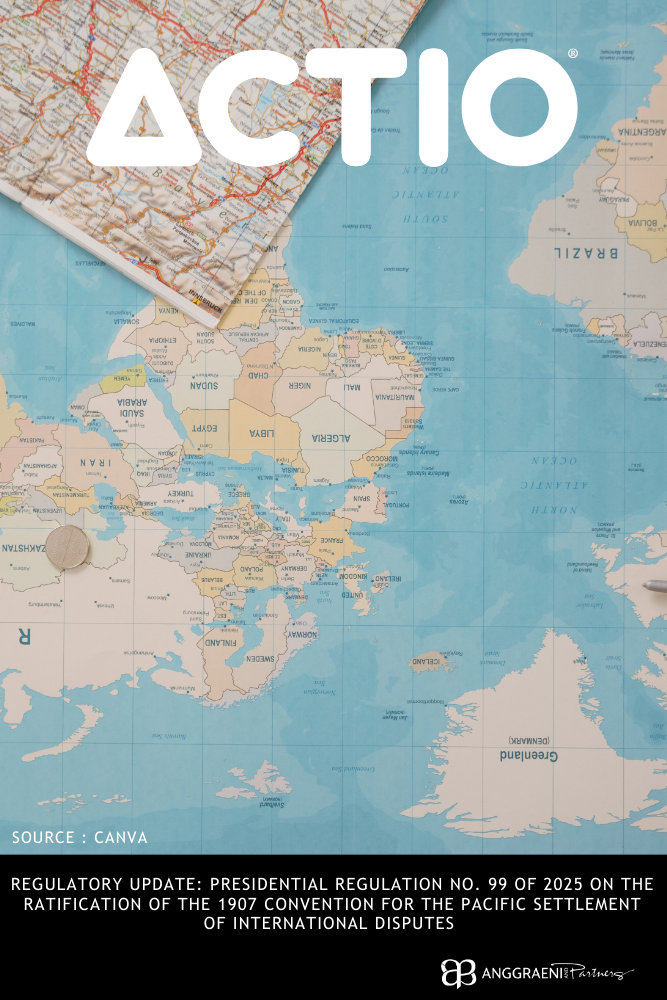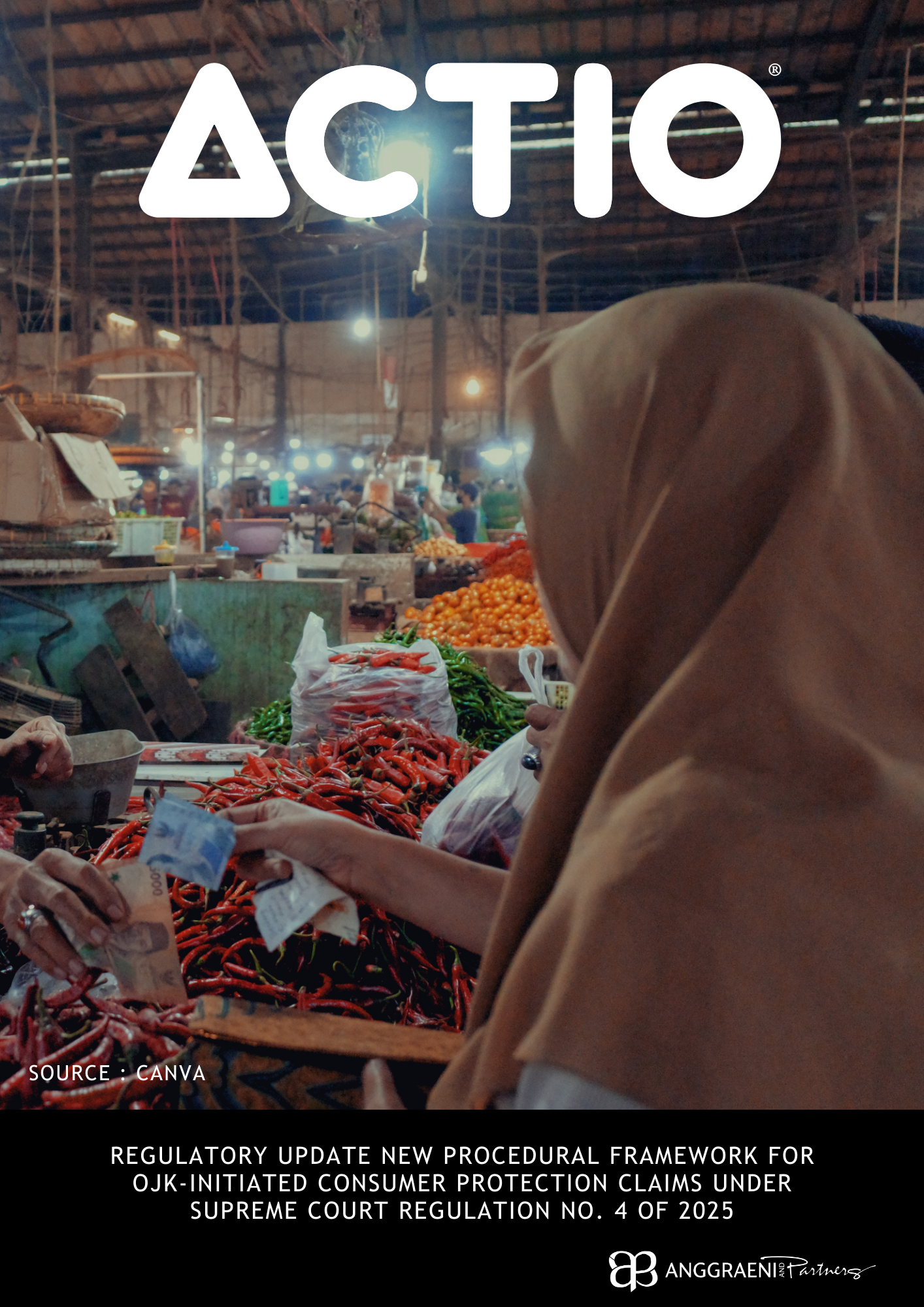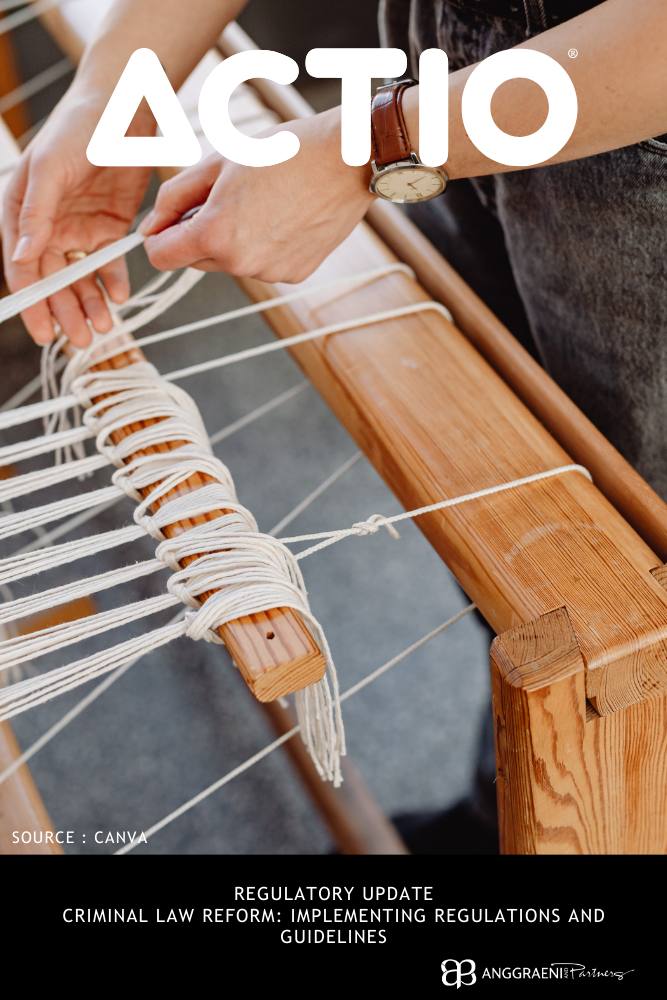- Home
- Capabilities
- ACTIO® Hub
- About Us
- Connect with Us
- AP Library
The Supreme Court Regulation Number 3 of 2023 (SCR 3/2023) introduces critical updates to the arbitration framework in Indonesia. This regulation aims to enhance the arbitration process by providing detailed procedures for the appointment of arbitrators, recusal rights, enforcement requests, and the annulment of arbitral awards. This article delves into these specific areas to offer a comprehensive understanding of the updated arbitration procedures and their implications for parties involved in arbitration within Indonesia.
The parties may determine the selection and appointment of arbitrators or arbitral tribunals. If the parties do not reach an agreement regarding the appointment of the arbitrator, the parties or either party may apply to the head of the district court to appoint an arbitrator or arbitral tribunal.[1] Against such application, the head of the district court hears the parties accompanied by reasons of disagreement and the proposal of the arbitrator or arbitral tribunal.[2] The head of the district court shall appoint the arbitrator or arbitral tribunal no later than 14 (fourteen) days from the date of the application submission in the form of a determination.[3] Against such determination, the right of recusal may be submitted no later than 14 (fourteen) days from the determination if there are sufficient reasons and sufficient authentic evidence to raise doubts that the arbitrator will not perform his duties freely and will be partial in making the award.[4]
The arbitrator who is appointed can be sued for refusal when there are sufficient reasons and authentic evidence to cast doubt that the arbitrator will be unable to carry out his or her duties freely and take sides in making an award.[5] The claim is proven by the existence of a family, financial or work relationship with one of the parties to the dispute or their attorney.[6]
Examination of disputes in arbitration is carried out in writing and verbal hearings can be carried out if agreed by the parties or deemed necessary by the arbitrator or arbitral tribunal.[7] Dispute examinations of this type are carried out behind closed doors in camera and are not open for public.[8] The dispute must be examined within 180 days after the arbitrator or arbitral tribunal is formed. This period of time to examine these disputes may be extended by agreement of the parties and, if necessary, be extended by the arbitrator or arbitral tribunal following a request submitted by one of the parties regarding certain particular matters as a result of a provisional award or other interlocutory awards, or if deemed necessary by the arbitrator or arbitral tribunal for inspection purposes.[9] During the examination for dispute settlement through arbitration, the district court will not interfere and will even refuse to examine a dispute that has previously been determined to be resolved by arbitration.[10]
Article 54 of the AADR Law explicitly regulates the structure of arbitral awards. Arbitral awards must contain information such as:
a heading to the award that reads ‘For the sake of Justice based on belief in the Almighty God’;
full names and addresses of the parties;
a brief description of the dispute;
the establishment of the parties;
the full name and address of the arbitrator;
the considerations and conclusions of the arbitrator or arbitral tribunal regarding the entire dispute;
the opinion of each arbitrator if there is a difference of opinion in the arbitral tribunal;
the order of judgment;
the place and date of the award; and
a signature of the arbitrator or arbitral tribunal.
According to Article 54 paragraph (2) of the AADR Law, an arbitrator’s inability to sign the award due to illness or death does not invalidate the award’s effectiveness. Additionally, it is generally accepted in civil procedure that a decision must contain the heading above. Otherwise, such decision will become null and void.[11] This also unexceptionally applies to arbitral awards. Thus, the usage of such heading constitutes as a part of procedural formality. Its absence may cause the award to be regarded as defective, and subsequently, at risk of becoming unenforceable.
The arbitral award is final in nature, has permanent legal force and is binding on the parties based on the provisions of Article 60 of the AADR Law. However, an arbitral award can be subject to annulment if it is suspected of containing either of the following elements:[12] a letter or document submitted for examination after the verdict has been rendered that is recognised as fabricated or declared to be fabricated; after the award is rendered, decisive documents that were hidden by the opposing party are discovered; or the award was rendered as the result of a deceit by one of the parties during the examination of the dispute. The legal basis for the request for arbitral award annulment must be submitted by attaching related documents or evidence.[13] Furthermore, the arbitration institution is not a party in submitting a request for an annulment of an arbitral award.[14] It is also important to note that annulment is exclusively pertinent to domestic arbitral awards.
Annulment requests for arbitral awards are to be submitted directly or electronically[15] within 30 days following the award’s registration. This is in accordance with Articles 70 and 71 of the AADR Law and further detailed in SCR 3/2023. Upon receipt, the court’s chairman appoints a panel of judges to examine the annulment request.[16] The trial process for annulment requests of arbitral awards is simple, quick, and cost-effective.[17] The decision on the annulment request is pronounced 30 (thirty) days after the request is read in court.[18] In summary, the stages of the trial examination of the annulment request of arbitral awards are as follows:[19] reading of the request annulment, response from the Respondent, interlocutory decision (if applicable), and finally, the reading of the decision. For the evidence session, an opportunity is given once to both the Applicant and the Respondent,[20] and the decision reading session can only be postponed once considering the time frame for the decision reading, which is a maximum of 30 (thirty) days from the request annulment is read.[21]
Legal measures to file an appeal to the Supreme Court is limited to the decision that grants the annulment of the arbitral award.[22] The appeal is submitted in writing at the latest 14 days after the decision is pronounced or notified to the parties.[23] The court will notify the appellee at the latest 3 (three) days after the appeal is registered[24] and the appellee has the rights to submit their counter at the latest 7 (seven) days after receiving the notification[25]. The parties are given a maximum of 3 days for inspection from the notification date[26]. The appeal documents are sent to the Supreme Court at the latest 25 (twenty five) days since the registration of appeal[27] and the Supreme Court decides on the appeal at the latest 30 days after the appeal is registered at the Supreme Court.[28] The decision of the Supreme Court is final, and no further legal measures are available.[29] Unlike the decision on the annulment request that is granted, no legal measures can be filed for the annulment request of arbitral awards that are rejected by the panel of judges.[30]
It is found that within 2019-2022, the annual breakdown of annulment of arbitral award requests and their outcomes are as below:[31]
| Year | Total cases | Total appeals | Final result of annulment requests | ||
| Granted | Rejected | Dismissed (N/O) | |||
| 2019 | 15 | 10 | 2 | 9 | 4 |
| 2020 | 23 | 14* | 2 | 14 | 7 |
| 2021 | 19 | 3 | 5 | 10 | 4 |
| 2022 | 13 | 4 | 5 | 1 | 7 |
| Total | 70 | 31* | 14 | 34 | 22 |
In 2019, out of 15 cases, 10 were appealed, resulting in 2 annulments, 9 rejections, and 4 dismissals. The following year, 2020, saw a rise in cases to 23, with 14 appeals, including two civil reviews. This year also observed 2 grants of annulment, but an increase in rejections to 14 and 7 dismissals. The year 2021 experienced a slight decrease in total cases to 19, with only 3 appeals. Interestingly, this year had the highest number of granted annulments at 5, alongside 10 rejections and 4 dismissals. The data from 2022 shows a further decrease in cases to 13, with 4 appeals. This year had a unique outcome with 5 annulments, only 1 rejection, and 7 dismissals.
The Supreme Court Regulation Number 3 of 2023 (SCR 3/2023) has introduced significant changes to the arbitration process in Indonesia. By clarifying procedures for the appointment of arbitrators, recusal rights, enforcement requests, and the annulment of arbitral awards, this regulation enhances the overall efficiency and fairness of arbitration proceedings. Legal practitioners and parties engaged in arbitration should be well-versed in these updates to effectively navigate the arbitration landscape in Indonesia.
To know more about this topic, stay tuned for more upcoming articles about arbitration from Anggraeni and Partners.
Footnotes :
[1] Article 4, Paragraph (1), Supreme Court Regulation No. 3 of 2023 on Procedures for the Appointment of Arbitrator by the Court, Recusal, Examination of Requests for the Enforcement and Annulment of Arbitral Awards.
[2] Article 4, Paragraph (2), Supreme Court Regulation No. 3 of 2023 on Procedures for the Appointment of Arbitrator by the Court, Recusal, Examination of Requests for the Enforcement and Annulment of Arbitral Awards.
[3] Article 4, Paragraph (3), Supreme Court Regulation No. 3 of 2023 on Procedures for the Appointment of Arbitrator by the Court, Recusal, Examination of Requests for the Enforcement and Annulment of Arbitral Awards.
[4] Article 4, Paragraph (4), Supreme Court Regulation No. 3 of 2023 on Procedures for the Appointment of Arbitrator by the Court, Recusal, Examination of Requests for the Enforcement and Annulment of Arbitral Awards.
[5] Article 22, Paragraph (1), Law No. 30 of 1999 on Arbitration and Alternative Dispute Resolutions.
[6] Article 22, Paragraph (2), Law No. 30 of 1999 on Arbitration and Alternative Dispute Resolutions.
[7] Article 36, Law No. 30 of 1999 on Arbitration and Alternative Dispute Resolutions.
[8] Article 27, Law No. 30 of 1999 on Arbitration and Alternative Dispute Resolutions.
[9] Articles 48 and 33, Law No. 30 of 1999 on Arbitration and Alternative Dispute Resolutions.
[10] Article 11, Paragraph (2), Law No. 30 of 1999 on Arbitration and Alternative Dispute Resolutions.
[11] Whilst the AADR Law does not explicitly provide this provision, the approach is generally accepted in Indonesia as mentioned in Art. 197 paragraph (2) of the Criminal Procedural Law (Kitab Undang-Undang Hukum Acara Pidana or KUHAP).
[12] Articles 70 and 71 of Law No. 30 of 1999 on Arbitration and Alternative Dispute Resolutions.
[13] Article 24, Paragraph (5), Supreme Court Regulation No. 3 of 2023 on Procedures for the Appointment of Arbitrator by the Court, Recusal, Examination of Requests for the Enforcement and Annulment of Arbitral Awards.
[14] Article 24, Paragraph (6), Supreme Court Regulation No. 3 of 2023 on Procedures for the Appointment of Arbitrator by the Court, Recusal, Examination of Requests for the Enforcement and Annulment of Arbitral Awards.
[15] Article 25, Paragraph (3), Supreme Court Regulation No. 3 of 2023 on Procedures for the Appointment of Arbitrator by the Court, Recusal, Examination of Requests for the Enforcement and Annulment of Arbitral Awards.
[16] Article 25, Paragraph (5), Supreme Court Regulation No. 3 of 2023 on Procedures for the Appointment of Arbitrator by the Court, Recusal, Examination of Requests for the Enforcement and Annulment of Arbitral Awards.
[17] Article 25, Paragraph (7), Supreme Court Regulation No. 3 of 2023 on Procedures for the Appointment of Arbitrator by the Court, Recusal, Examination of Requests for the Enforcement and Annulment of Arbitral Awards.
[18] Article 26, Paragraph (1), Supreme Court Regulation No. 3 of 2023 on Procedures for the Appointment of Arbitrator by the Court, Recusal, Examination of Requests for the Enforcement and Annulment of Arbitral Awards.
[19] Article 26, Paragraph (2), Supreme Court Regulation No. 3 of 2023 on Procedures for the Appointment of Arbitrator by the Court, Recusal, Examination of Requests for the Enforcement and Annulment of Arbitral Awards.
[20] Article 26, Paragraph (7), Supreme Court Regulation No. 3 of 2023 on Procedures for the Appointment of Arbitrator by the Court, Recusal, Examination of Requests for the Enforcement and Annulment of Arbitral Awards.
[21] Article 26, Paragraph (9), Supreme Court Regulation No. 3 of 2023 on Procedures for the Appointment of Arbitrator by the Court, Recusal, Examination of Requests for the Enforcement and Annulment of Arbitral Awards.
[22] Article 27, Paragraph (1), Supreme Court Regulation No. 3 of 2023 on Procedures for the Appointment of Arbitrator by the Court, Recusal, Examination of Requests for the Enforcement and Annulment of Arbitral Awards.
[23] Article 27, Paragraph (4), Supreme Court Regulation No. 3 of 2023 on Procedures for the Appointment of Arbitrator by the Court, Recusal, Examination of Requests for the Enforcement and Annulment of Arbitral Awards.
[24] Article 27, Paragraph (8), Supreme Court Regulation No. 3 of 2023 on Procedures for the Appointment of Arbitrator by the Court, Recusal, Examination of Requests for the Enforcement and Annulment of Arbitral Awards.
[25] Article 27, Paragraph (9), Supreme Court Regulation No. 3 of 2023 on Procedures for the Appointment of Arbitrator by the Court, Recusal, Examination of Requests for the Enforcement and Annulment of Arbitral Awards.
[26] Article 27, Paragraph (11), Supreme Court Regulation No. 3 of 2023 on Procedures for the Appointment of Arbitrator by the Court, Recusal, Examination of Requests for the Enforcement and Annulment of Arbitral Awards.
[27] Article 27, Paragraph (12), Supreme Court Regulation No. 3 of 2023 on Procedures for the Appointment of Arbitrator by the Court, Recusal, Examination of Requests for the Enforcement and Annulment of Arbitral Awards.
[28] Article 28, Paragraph (1), Supreme Court Regulation No. 3 of 2023 on Procedures for the Appointment of Arbitrator by the Court, Recusal, Examination of Requests for the Enforcement and Annulment of Arbitral Awards.
[29] Article 28, Paragraph (2), Supreme Court Regulation No. 3 of 2023 on Procedures for the Appointment of Arbitrator by the Court, Recusal, Examination of Requests for the Enforcement and Annulment of Arbitral Awards.
[30] Article 27, Paragraph (3), Supreme Court Regulation No. 3 of 2023 on Procedures for the Appointment of Arbitrator by the Court, Recusal, Examination of Requests for the Enforcement and Annulment of Arbitral Awards.
[31] Setyawati Fitrianggraeni, Eva Fatimah Fauziah, Sri Purnama, ‘Dealing with Unsatisfactory Arbitral Awards: Observing the Grounds of Annulment of Arbitral Awards in Indonesia’, (2023), 40, Journal of International Arbitration, Issue 6, pp. 735-764, https://kluwerlawonline.com/journalarticle/Journal+of+International+Arbitration/40.2/JOIA2023030
DISCLAIMER:
This disclaimer applies to the publication of articles by Anggraeni and Partners. By accessing or reading any articles published by Anggraeni and Partners, you acknowledge and agree to the terms of this disclaimer:
No Legal Advice: The articles published by Anggraeni and Partners are for informational purposes only and do not constitute legal advice. The information provided in the articles is not intended to create an attorney-client relationship between Anggraeni and Partners and the reader. The articles should not be relied upon as a substitute for seeking professional legal advice. For specific legal advice tailored to your individual circumstances, please consult a qualified attorney.
Accuracy and Completeness: Anggraeni and Partners strive to ensure the accuracy and completeness of the information presented in the articles. However, we do not warrant or guarantee the accuracy, currency, or completeness of the information. Laws and legal interpretations may vary, and the information in the articles may not be applicable to your jurisdiction or specific situation. Therefore, Anggraeni and Partners disclaim any liability for any errors or omissions in the articles.
No Endorsement: Any references or mentions of third-party organizations, products, services, or websites in the articles are for informational purposes only and do not constitute an endorsement or recommendation by Anggraeni and Partners. We do not assume responsibility for the accuracy, quality, or reliability of any third-party information or services mentioned in the articles.
No Liability: Anggraeni and Partners, its partners, attorneys, employees, or affiliates shall not be liable for any direct, indirect, incidental, consequential, or special damages arising out of or in connection with the use of the articles or reliance on any information contained therein. This includes but is not limited to, loss of data, loss of profits, or damages resulting from the use or inability to use the articles.
No Attorney-Client Relationship: Reading or accessing the articles does not establish an attorney-client relationship between Anggraeni and Partners and the reader. The information provided in the articles is general in nature and may not be applicable to your specific legal situation. Any communication with Anggraeni and Partners through the articles or any contact form on the website does not create an attorney-client relationship or establish confidentiality.
By accessing or reading the articles, you acknowledge that you have read, understood, and agreed to this disclaimer. If you do not agree with any part of this disclaimer, please refrain from accessing or reading the articles published by Anggraeni and Partners.
For further information, please contact:
P: 6221. 7278 7678, 72795001
H: +62 811 8800 427
Anggraeni and Partners, an Indonesian law practice with a worldwide vision, provides comprehensive legal solutions using forward-thinking strategies. We help clients manage legal risk and resolve disputes on admiralty and maritime law, complicated energy and commercial issues, arbitration and litigation, tortious claims handling, and cyber tech law.
S.F. Anggraeni
Managing Partner
Eva F Fauziah
Senior Associate Practice Group International Arbitration and Litigation and Head of Legal Lab.
eva.ff@ap-lawsolution.net
Nurmanto
Middle Associate Practice Group International Arbitration and Litigation
Irvena Ayunya Dewanto
Junior Associate Practice Group International Arbitration and Litigation
Practice Group International Arbitration and Litigation
irvena.ad@ap-lawsolution.net
Sri Purnama
Junior Legal Research Analyst
sri.p@ap-lawsolution.net


